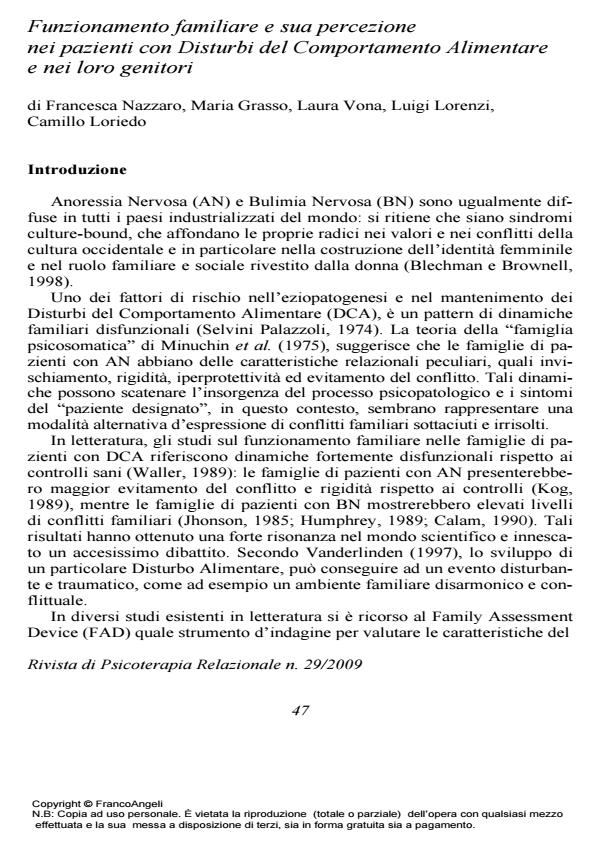Funzionamento familiare e sua percezione nei pazienti con Disturbi del Comportamento Alimentare e nei loro genitori
Titolo Rivista RIVISTA DI PSICOTERAPIA RELAZIONALE
Autori/Curatori Francesca Nazzaro, Maria Grasso, Laura Vona, Luigi Lorenzi, Camillo Lorieo
Anno di pubblicazione 2010 Fascicolo 2009/29
Lingua Italiano Numero pagine 20 P. 47-66 Dimensione file 979 KB
DOI 10.3280/PR2009-029003
Il DOI è il codice a barre della proprietà intellettuale: per saperne di più
clicca qui
Qui sotto puoi vedere in anteprima la prima pagina di questo articolo.
Se questo articolo ti interessa, lo puoi acquistare (e scaricare in formato pdf) seguendo le facili indicazioni per acquistare il download credit. Acquista Download Credits per scaricare questo Articolo in formato PDF

FrancoAngeli è membro della Publishers International Linking Association, Inc (PILA), associazione indipendente e non profit per facilitare (attraverso i servizi tecnologici implementati da CrossRef.org) l’accesso degli studiosi ai contenuti digitali nelle pubblicazioni professionali e scientifiche.
Anorexia Nervosa and Bulimia Nervosa are equally diffused in all industrial countries of the world, therefore they are said to be culture-bound syndromes. One of the risk factors in pathogenesis and maintenance of eating disorders is a dysfunctional pattern of family dynamics. The aim of this study was to describe family functioning in ED in comparison with controls, and to study the influence of the family role and the type of ED diagnosed, on the perception of family interactions. 32 patients with eating disorders and their parents, for a total of 87 persons, completed the Family Assessment Device (FAD). Clinical families were paired for gender, age and social-economic status to a control group constituted by 24 families, for a total of 68 participants. The clinical families perceived their family functioning as significantly worse than control families on every area of the FAD. Our research’s results confirm that ED patients report non-functional family interaction. Particularly, data’s detailed exam, let emerge important results on communication, affective and behavioural functioning.
Parole chiave:Disturbi del Comportamento Alimentare, McMaster Model of Family Functioning, Family Assessment Device, Genitori, Comunicazione.
Francesca Nazzaro, Maria Grasso, Laura Vona, Luigi Lorenzi, Camillo Lorieo, Funzionamento familiare e sua percezione nei pazienti con Disturbi del Comportamento Alimentare e nei loro genitori in "RIVISTA DI PSICOTERAPIA RELAZIONALE " 29/2009, pp 47-66, DOI: 10.3280/PR2009-029003